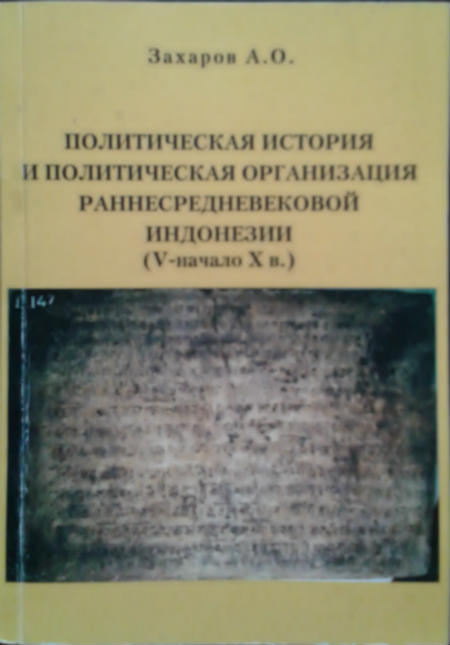Книга
 Политическая история и политическая организация раннесредневековой Индонезии (V – начало X в.)
Политическая история и политическая организация раннесредневековой Индонезии (V – начало X в.)
Захаров Антон Олегович
Ответственный редактор: Тюрин Владимир Александрович
Москва, 2012, 202 стр.
Книга представляет собой исследование политической истории и
политической организации царств Явы, Суматры и Калимантана в
раннем средневековье – с V по начало Х в. Она написана на основе
эпиграфики, археологии и свидетельств китайской и арабской традиций. Первая глава посвящена теориям ранней государственности и
юго-восточноазиатского государства. Во второй рассматриваются
древнейшие письменные общества на территории современной Индонезии: царства Мулавармана на Калимантане и Пурнавармана на Западной Яве. Третья глава характеризует древнемалайское царство
Шривиджаю на Юго-Восточной Суматре. В четвёртой реконструируется общественно-политическая история Центральной и Восточной
Явы в VIII – начале Х в.
English version
The monograph reconstructs political history and institutions of early kingdoms of Borneo, Sumatra, and Java.
Chapter 1 analyses contemporary theories of statehood and political organization.
Chapter 2 offers the Russian translations of earliest Sanskrit inscriptions from Borneo and Western Java. It investigates polities of Mūlavarman in Borneo and Pūrṇavarman in Western Java; the latter is known as Tarumanagara.
Chapter 3 deals with the polity of Srivijaya. It contains an analysis of the oath inscriptions of Srivijaya, a review of recent archaeological investigation in Sumatra and Bangka, and a reconstruction of foundations of royal power in Srivijaya.
Chapter 4 gives the Russian translations of some Central and Eastern Javanese inscriptions, including the Canggal, Dinojo, and Kalasan records. It investigates the question of the Śailendra dynasty. While Javanese communities (wanua) were autonomous, they were subjected to the Javanese monarchies (kěraton). The kings of Ancient Java were autocratic. The state formation in maritime Southeast Asia was inextricably intertwined with warfare. All early rulers conquered their neighbours and thus became kings. The Indianisation of early kingdoms was a means to power and varied in different places and times.


